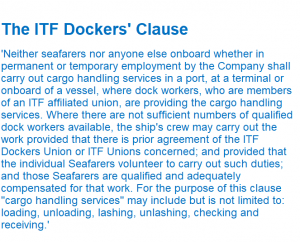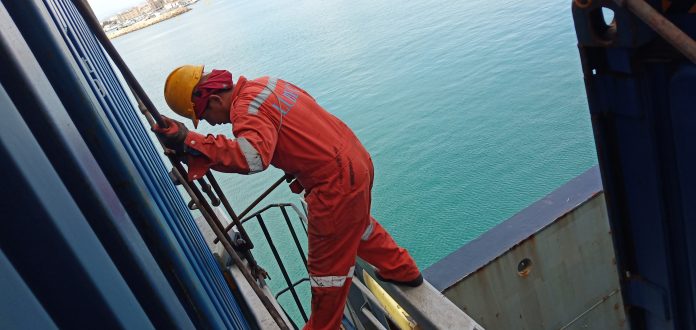Unions launched a legal challenge against ship operators who they claim are reneging on an internationally agreed deal in 2019, following a complaint filed with the European Competition Directorate by six, unnamed, carriers.
Six European short sea container carriers wrote to the European Commission (EC) on 19 May complaining that rules governing the lashing of containers onboard ships breach European competition rules, because, Container News understands, the carriers cannot use competing bodies for the work. So far the letter has not reached the unions, who remain in the dark.
It is understood that the six carriers, who include Unifeeder, BG Freight, Samskip and Eucon, wrote to the EC claiming that trade unions, the International Transport Workers Federation (ITF) and the Dutch union FNV Bondgnoten, are forcing ship operators to use dockers, rather than vessel crew to lash containers. This, they say, is a restrictive practice and violates European Union (EU) competition law.
Robbert Jaspers, of law firm AKD, which has offices in Belgium, Luxembourg and The Netherlands, who is acting for the feeder operators told Container News, that the complaint concerns the dockers clause as laid down in the International Bargaining Forum collective bargaining agreement, negotiated last year with shipowners’ body the Joint Negotiating Group (JNG) and maritime unions and which came into force on 1 January this year.

According to Jaspers, “Competition is restricted amongst others as according to the dockers clause seafarers cannot do the lashing, even though this has in certain circumstances traditionally been done by them. In this sense our clients do not feel represented by the JNG.”
An EC spokesperson said, “We can confirm the receipt of the complaint by European shortsea and feeder ship operators, which we are assessing as per our standard procedures.”
Both the EC and the lawyer declined to name the complainants, and with the ITF yet to receive the complaint the union said, “The petitioners of the complaint have so far refused to share the complaint with the ITF. Therefore, the ITF cannot comment in more detail.”
However, the union has initiated legal proceedings against the carriers, arguing that the agreement does not breech EU competition regulations, and that, “The complaint appears to be a tactical reaction to these legal proceedings and seeks to avoid compliance with the NSWC [the non-seafarers work clause, also known as the dockers clause]”.
According to the ITF, the dockers clause seeks to protect crew from unsafe practices and fatigue by making sure that this dangerous work is completed in safe places by those trained and skilled in the work.
One industry source said the lashing work on board container vessels often “exposed the crew to safety issues”. The source added that feeder operators do not want to wait two or three hours for dockers to work their vessels, they want the lashing done immediately, including the unplugging of any reefers to be handled.
“All feeder operators are complaining, mainly in Northern Europe, but also in the Mediterranean, Asia and the US,” said the source who argued that in the past crew would complete the unlashing operations, often before the vessel docked, considerably speeding up the cargo handling process.
However, there are dangers involved in crew performing lashing duties as revealed in the Container News Cargo Integrity Campaign which highlighted the inherent dangers of crew working on moving vessels with a number of accidents having taken place in Europe and the US.
The industry source said part of the problem is that the terminals do not employ sufficient dock workers knowing that, cheaper crew will complete the work, that reduces the costs for terminals and ship operators while the crew, often from low pay countries are forced to work long hours doing work that they are not trained to complete.
At least two crew have lost their lives over the last few years completing lashing operations, one on the St Lawrence when he fell from the Maersk Patras into freezing water and another in Dublin when a crewman was crushed during cargo handling operations in 2017.
The unions say they have evidence that cadets and galley staff are forced into dangerous situations, fearing for their jobs. They have many letters from crew asking for union help so that they do not have to do this dangerous and arduous work.
Nick Savvides
Managing Editor







